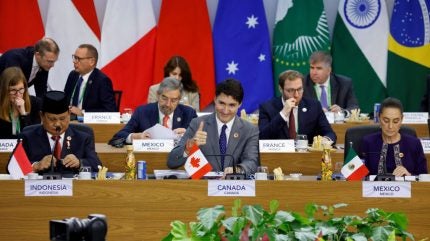
During his campaign, US President-Elect Donald Trump told the Detroit Economic Club that, if elected, he would invoke the renegotiation clause of the US-Mexico-Canada Agreement (USMCA). The USMCA, passed in 2018 under Trump’s first term, replaced the North American Free Trade Agreement (NAFTA), which took effect in 1998 and reshaped the continent’s economic structure. Harris, if she had been elected, would have also invoked the renegotiation clause, having blasted Trump’s brokerage of the deal for making it “far too easy” for auto companies to outsource jobs.
Now, as Mexico’s ideologically left rule continues under President Claudia Sheinbaum, Canada’s veteran liberal President Justin Trudeau faces a tough election, and with Trump in office for four more years, there will be many interests at play in a renegotiation.
Differences between USMCA and NAFTA
The USMCA is, for the most part, the same as NAFTA. It lifts tariffs on goods traded between the US, Canada and Mexico. Its implementation in 2018 had bipartisan support in the US, where many felt NAFTA was outdated.
However, some of the USMCA’s updated provisions have come under fire as the US’ technological and trade war with China has intensified.
The USMCA requires 75% of an automotive’s parts to be locally produced in order to be traded freely and without tariffs between the three countries. The workers making some of these components also have to be earning a minimum wage of $16 an hour.
Other provisions included measures to tackle labour laws, increase market access for dairy products, update technology regulations, provide slightly more (but for many insufficient) environmental protections and keep Congress in control of biologic drugs.
China skirting EV restrictions through Mexico
As the US ramped up restrictions on the import of Chinese electric vehicles (EVs) into its coveted market, the Chinese industry pivoted to Mexico. In 2023, Chinese EV providers exported $4.6bn (33.32bn yuan) worth of cars to Mexico, according to the country’s Ministry of Economy.
“The Chinese automakers came to the country very aggressively,” said Mexico’s former deputy minister for international trade Juan Carlos Baker. He highlighted that, at half the price of the cheapest Tesla, the Chinese companies are offering “a good product that sells at a very reasonable price”.
The possibility of Chinese automakers like BYD building plants in Mexico has raised eyebrows in both the US and Canada, who fear that the USMCA will be exploited to push these vehicles into the North American marketplace.
The USMCA permits non-taxed auto imports if they are locally sourced within its member countries.
“Mexico is an attractive production platform, not only for Chinese companies, but for other companies as well, in part because of that free trade access that it has to the American market – and it can do something that in trade terms is called circumvention,” according to Alliance for American Manufacturing President Scott Paul.
The degree of Chinese interest and business in Mexico is in sharp contrast to the US and Mexico, which have both imposed EV import restrictions for cars coming from China because of an alleged policy of overproduction that was eroding the local North American auto markets.
Leaving Mexico out?
Canada’s Deputy Prime Minister, Chrystia Freeland, who oversees Canada-US relations, has expressed worry over Chinese goods entering the North American market through Mexico.
“We are perfectly aligned with the United States and that means we are not a back door to unfair Chinese traded goods. The same cannot be said about Mexico,” Freeland said in a press conference.
Doug Ford, Ontario’s Premier, hosted a call with all 13 of Canada’s provincial and territorial premiers and said they want the federal government to negotiate a bilateral trade deal with the US that does not include Mexico.
Mexican President Sheinbaum said Trudeau has assured her that his government did not support excluding Mexico from the deal. However, Trudeau later said that while leaving Mexico out would not be his “first choice”, he is “leaving all doors open”.
As Mexico is being pressured to choose between China and its North American partners, it already seems that Sheinbaum has chosen the latter. According to her, her government has “a plan with the aim of substituting these imports that come from China, and producing the majority of them in Mexico, either with Mexican companies or primarily North American companies”.
Mexican lawmakers are also reconsidering an ongoing process to eliminate six independent regulatory agencies, which former President Andres Manuel Lopez Obrador had considered wasteful. Among these are the anti-monopoly commission and telecommunications regulators. The plans are being tweaked to meet the minimum requirements set out in the USMCA.
Changes
International law firm White & Case predicts that some of the US’ interests in the eventual renegotiation of the USMCA will include “supply chain disruptions, expanded anti-forced labour import provisions, new measures to jointly block Chinese companies from the North American market, measures to promote critical minerals development and investment protection, incentives for nearshoring, new border management practices, specialised rules for origin of EVs, provisions on digital services (new areas of regulation like AI) and accession mechanism for other countries in LATAM [Latin America].”
Mexico’s acquiescence will be welcome in the US, where China’s growing influence in Latin America has been raising concerns for a long time. It also suggests that, despite a politically fractured world leaning towards protectionism, having friendly neighbours continues to seem like the best bet.



